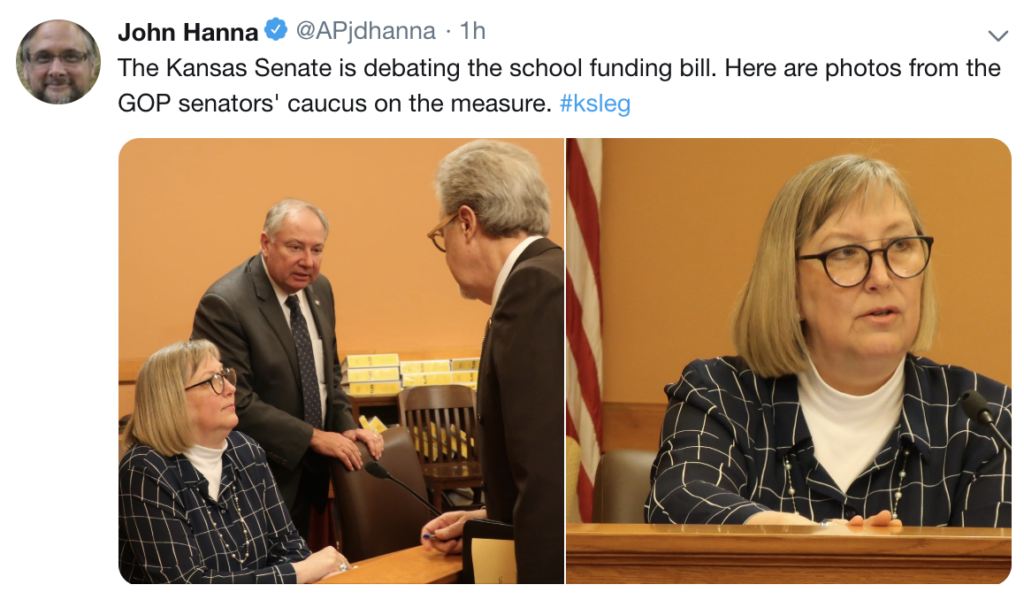
Wednesday; 1:30 PM conference committee meeting
This meeting started with a review by staff on what items had been agreed to and which were still unresolved.
The House then made a counter-offer to the Senate offer on finance made last evening. Here are the House points:
- Accept the Senate position on bilingual education with advancing the LPA audit by two years,
- Accept the Senate position not requiring a study of graduation requirements (financial literacy and computer science),
- Accept the original Senate position on special education funding, keeping the 92% in place as in current law,
- Maintain the House position on the artificial base for LOB calculation,
- Maintain the House position on certification of instructional costs,
- Accept the Senate position on bullying – no new provisions,
- Maintain the House position on tuition tax credits, changing to the 100 lowest performing elementary schools,
- Accept the Senate position on bond approval limits (stay with current law),
- Accept the Senate position on transportation (stay with current law),
- Reject the Senate’s finance package (same as the KSDE and the Governor),
- Maintain the current House position on accountability reports,
- Bring mental health program into the discussion.
Williams used the bulk of the meeting time to chastise the Senate for not accepting the House positions, accusing Senators of not caring about kids who are bullied and who commit suicide while she also attacked their support for the 92% reimbursement standard for special education.
In closing the meeting, Williams announced that the House would have a new offer on out-of-state students at their next meeting. And that next meeting will take place at 4:30 Wednesday
Wednesday; 4:30 PM conference committee meeting
The final conference committee meeting had plenty of memorable moments.
Many folks were wondering what the impact of the new finance plan that Speaker Ron Ryckman (R-Olathe) had presented to the Republican caucus in the morning would have on proceedings. Everyone knew that Ryckman and some of his allies had been courting members of the House all day looking for support. If strong support for his “Kids First (but not really) Plan” was there, what would happen to this conference
The Senate, as we’ve reported, was sticking to their position in SB 142 – the finance plan recommended by the State Board of Education, supported by the Governor, and approved on a vote of 32 to 8 in the Senate. SB 142 provided $90 million in new school aid in the coming year. The Ryckman plan would have
Kristey Williams (R-Augusta) came to the conference committee meeting and announced she was retracting the last House offer and that, after a 15 minute recess, she would return with what would be the last House offer, including money.
When she came back she made an offer that was the House position on most of the unresolved policy position but they would grant the Senate position on funding if the Senate would agree to repeal the CPI adjustments in the out years. It was clear that the votes in the House were not there for the so-called “Kids First Plan.”

The Senate did not yield. After several rounds back and forth, it was clear that the Senate was not going to budge on school finance and on certain pieces of policy. The three members of the Senate team – Molly Baumgardner (R-Louisburg), Jim Denning (R-Overland Park), and Anthony Hensley (D-Topeka) – showed a united front and supported each other in the arguments back and forth.
Williams grew angrier with each back and forth eventually accusing Denning and Baumgardner of not being Republican enough for opposing her demand to repeal the CPI and demanding that superintendents sign letters saying they had sufficient resources to help every child meet the Rose standards.
Baumgardner, who maintained a calm, professional demeanor throughout the process, finally let Williams know that she did not appreciate the ad hominem attacks on the Senators and accusations leveled at them. She then urged the House to take a caucus to come up with a final response to the Senate’s positions.
The House members left and after a long break returned to the table. Williams read from a prepared script that called the bill the “Senate/Governor Kelly plan”- perhaps in an effort to humiliate her Republican colleagues- and berated the Senators for working with the Governor and sticking to what she (Williams) deemed to be an irresponsible plan. But with that, she announced the House would take what the Senate offered and run it on the floor. Baumgardner adjourned the meeting.
With a determined, bipartisan approach, the Senate negotiators had managed to get SB 142 accepted as the Gannon finance response and the House backed off nearly all of their policy proposals.
Gone was the limit on bilingual education. The 92% special education reimbursement still stands. Superintendent certification of spending was abandoned along with limits on at-risk funds, an unworkable transportation policy, and much of the most expansive reporting requirements.
The result is a bill that might very well resolve the Gannon lawsuit and put the state back in constitutional compliance on school funding.
You can read the brief explaining the conference committee report by clicking here.
Thursday on the floor…
The House took up the conference committee first and adopted it on a vote of 76 to 47. Click here to see how your Representative voted.
The Senate took it up later that same day and adopted it on a vote of 31 to 8 (vote record here). The bill now goes to the Governor who is expected to sign it into law.
What happens next?
The Attorney General’s office is now tasked with writing a brief for the Supreme Court in defense of the actions taken. That brief is due on April 15 with oral arguments to follow in May.


